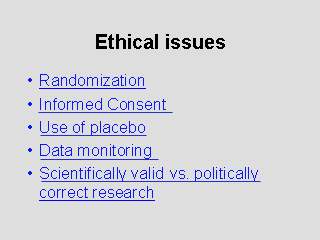|
Is it ethical to randomize patients to treatment? Is it ethical NOT to
randomize when a promising new treatment is available but has unknown
efficacy? Can truly informed consent ever be obtained? When is the use of a
placebo appropriate? Should treatment effects (beneficial and/or adverse) be
monitored during the trial and how should interim results be used?
In many countries, research is not considered ethical unless it has been
approved by an external review group charged with ensuring adherence to
ethical standards (often referred to as an institutional review board or an
ethics review committee). In most cases, participants must be informed about
the nature of the trial as well as the potential risks and benefits of
participating, and generally explicit consent for participation must be
granted. The issue of when it is ethical to use a placebo (untreated group)
for comparison is currently being debated.
In some cases, the interests of science conflict with those of community
ethics. A case in point is the current requirement for gender and
racial/ethnic
"representativeness"
in clinical trials sponsored by the U.S. National Institutes of Health.
These and many other ethical issues are inherent in the design and conduct of
clinical trials. Discussions of these topics are available in the current
literature and in many internet sites.
|
